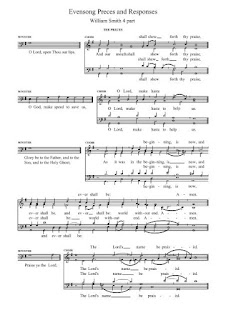"With comfort and heavenly delight": Richard Hooker, William Smith, and Choral Evensong
Recently, laudable Practice suggested that a return of a 'West Gallery' tradition could aid Mattins and Evensong in smaller churches. Evensong, I said, "does not require an organ and large choir". I went on to say "the choral tradition is, where it may be had, a gift to be received with gratitude". Two quite contrasting experiences of Evensong following that post demonstrated the strengths of both approaches.
Firstly, I was preaching at contemporary Evening Prayer for Harvest Thanksgiving in a friend's rural parish. A small, unrobed, makeshift choir for the event led hearty singing of traditional harvest hymns, accompanied by an electronic keyboard. It was a joyous expression of what I had sought to describe as 'West Gallery' Evensong.
The second Evensong, however, was a reminder to me of the gift of the choral tradition and it will be the focus of this post. The parish in which I serve has monthly Choral Evensong. On a windy, dark Autumn evening, around Michaelmas, William Smith's setting for the preces and responses were beautifully sung by the choir. It was the gentleness of 'The Lord be with you; And with thy spirit' which particularly struck me.
I have, of course, heard it said or sung many times over the course of my life. Why on that particular evening it touched me, I cannot say for certain. Perhaps it was Smith's gentle setting for the 'And with thy spirit'. Perhaps it was this being the first time for some months that Evensong had been sung as it got dark. Perhaps it was whatever was preoccupying me that day.
Whatever the reason, the choir's singing of the short response captivated me, leading me into the prayers. It spoke of the gracious love of God enfolding us, enfolding me, in the depths of our being, as the Kyries and Lord's Prayer were sung.
Driving home, as I reflected on the experience, a passage from Hooker half came to mind. After some searching, I found the passage, the closing words of A Learned Discourse of Justification:
Now the God of peace give you peaceable minds, and turn it to your everlasting comfort.
The words are vintage Hooker: the Preface to The Lawes opens and closes with an invocation of "the God of peace". This is what I experienced at that Choral Evensong, as the choir sung 'And with thy spirit'. The abiding promise of the God of peace, holding us, indwelling us, on a windy, dark Autumn evening and always.
This would not, I think, have surprised Hooker. In Book V of The Lawes, he writes of the singing of the Psalms in the offices:
a thinge, which as Basil was perswaded, did both strengthen the meditation of those holie wordes which were uttered in that sorte, and serve also to make attentive and to raise up the hartes of men ... a thinge which filleth the minde with comefort and heavenly delight, stirreth up flagrant desires and affections correspondent unto that which the wordes conteine ... watreth the harte to the ende it may fructifie ... serveth as a most approved remedie against all dolefull and heavie accidentes which befall men in this present life (V.39.4).
Meditation. Raising up the heart. Comfort and heavenly delight. Watering the heart. Such is the effect of Choral Evensong, of the singing of this office, its psalms and canticles, and - yes - the preces and responses, even when as seemingly prosaic as 'The Lord be with you; And with thy spirit'.
As I write this, I begin to wonder about William Smith, the minor canon of Durham Cathedral whose setting for the preces and responses so touched me that evening. Part of Cosin's circle in Durham, he received holy orders in 1626 and 1627, at the outset of the reign of Charles I. He almost certainly would have been present in the Cathedral when it received the King in 1633. Williams died, however, in dark times, just months before the King's cause was defeated on the field of Naseby in 1645, and as Parliament prohibited the Prayer Book, episcopacy, and liturgical music. The Laudian vision, shared by Williams, appeared to be in ruins.
The dark days eventually passed. Laud's vision for the churches of these Islands was largely restored, and so Williams' setting for the preces and responses would be heard at Prayer Book Evensong in an Irish Anglican parish church centuries later, a foretaste of the "comfort and heavenly delight" in which Williams now fully shares.
The choral tradition is a gift to be cherished. It is not, of course, necessary for Evensong. But, as evidenced by the continued growth of Choral Evensong, it is a rich source for peaceable contemplation and meditation on the joys, truths, and comforts of the Christian faith, as mediated by the Book of Common Prayer. As Simon Reynolds has said in Lighten our Darkness: Discovering and celebrating Choral Evensong (2021), it is a means for us "to be drawn more deeply into the orbit of God's redeeming and healing love".
(Below, Williams' preces and responses. The fact that they are here sung by the combined choirs of the seven Scottish Episcopal cathedrals would please both Laud and Williams: Laud, who envisioned the churches of these Islands united by episcopacy, Prayer Book, and decent ceremonies; Williams, who endured the Scottish occupation of Durham - and the vandalising of the Cathedral - during the Second Bishops' War.)




Comments
Post a Comment